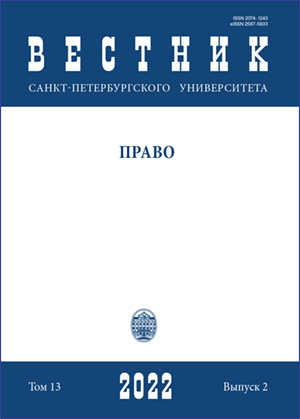Prospects for digital modernization of criminal procedure in Tajikistan
DOI:
https://doi.org/10.21638/spbu14.2022.211Abstract
The study analyzes the significance and timeliness of the introduction of digital technologies in the criminal procedure activities of the judicial and law enforcement agencies of Tajikistan in the context of reforming the internal affairs bodies. It also explores the prospective parameters for the introduction of modern technologies for accounting for the quantitative and qualitative components of crime. Modification of crime accounting through the phased commissioning of the project “Electronic Crime Record Book” will give law enforcement a different look, aimed at the interaction of state bodies and the population. Opportunities and promising directions for improving the accounting of crimes will be based on the electronic interaction of state bodies, officials and members of the public. The platform for the introduction of information and telecommunication technologies is the structural divisions of the internal affairs bodies, which register the bulk of all statements and reports on crimes and incidents. The main criterion in the modernization of criminal procedure is the development of a unified model of the system of accounting and registration activities, which will cover not only the accounting of crimes, but also intermediate and final procedural decisions. The main emphasis in the project is aimed at the development and qualitative improvement of interaction between law enforcement and judicial authorities, through which the domestic system of criminal policy is being modernized. The modernization of the criminal procedure reality testifies to the additional elaboration of the full coverage of quantitative data on crime and a comprehensive response to each statement and message. Additionally, it is required to clarify the content of the Concept for the development of informatization and the unified information and communication system of the internal affairs bodies of Tajikistan and other sectoral regulatory legal acts for the next period of reform.
Keywords:
digital technologies, project, crime, criminal procedure, law enforcement agencies, judicial authorities
Downloads
References
Downloads
Published
How to Cite
Issue
Section
License
Articles of "Vestnik of Saint Petersburg University. Law" are open access distributed under the terms of the License Agreement with Saint Petersburg State University, which permits to the authors unrestricted distribution and self-archiving free of charge.






